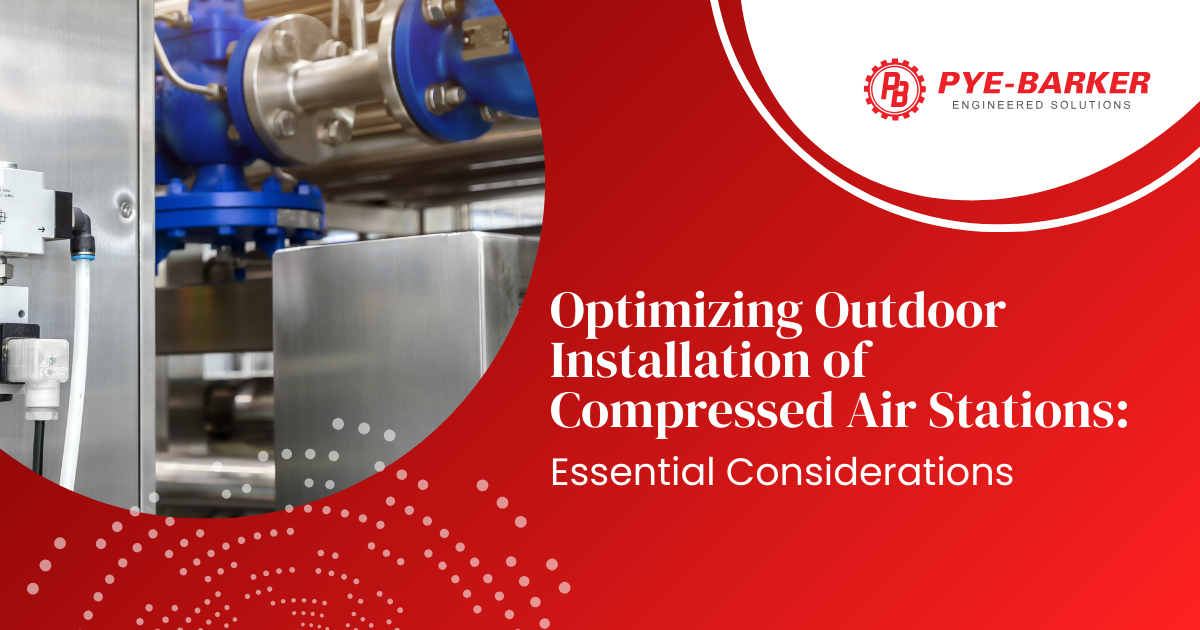Factors to Optimize Outdoor Compressed Air Stations
Outdoor installations of compressed air stations pose unique challenges, particularly concerning weather protection and operational efficiency. For industrial businesses seeking to optimize their compressed air systems, several critical considerations must be addressed to ensure functionality and longevity.
Weather Protection for Outdoor Compressed Air Stations
Outdoor installation of compressed air stations demands robust weather protection measures to safeguard equipment from elemental damage.
Recommended Weather Protection Measures
- Utilize Weatherproof Enclosures: NEMA 4 controls, TEFC motors, and sound enclosures offer essential protection against rain, snow, ice, and dust infiltration.
- Implement Shelter Structures: Erect lean-to covers or awnings to shield compressors from adverse weather conditions.
- Consider Cold Weather Operation: Install units within heated shelters to prevent freezing and mitigate cold weather-related issues.
Cold Weather Operation Guidelines
Cold weather poses specific challenges for outdoor compressor operation, necessitating proactive measures to ensure functionality in sub-zero temperatures.
Guidelines for Cold Weather Operation
- Prevent Freezing: Heat all drains, traps, and control lines to avoid condensate freezing using heat tape with thermostat control.
- Bypass Air-Cooled Aftercoolers: In extremely cold conditions, consider bypassing air-cooled aftercoolers to prevent freezing.
- Provide Shelter: Shield compressors with plywood windbreaks to protect against drifting snow.
- Use Recommended Lubricants: Opt for Gardner Denver AEON 9000 SP lubricant for optimal performance in cold climates.
- Monitor Operation: Vigilantly observe unit functionality during start-up and operation in cold weather conditions.
- Ensure Electrical Enclosure Protection: Specify NEMA 4 enclosures for electrical devices to prevent weather-related damage.
Maintenance Considerations for Outdoor Installation
Proper maintenance practices are essential to mitigate potential issues associated with outdoor installation of compressed air stations.
Maintenance Recommendations
- Address Condensate Accumulation: Insulate outdoor pipes and condensate drains to prevent freezing and potential system damage.
- Select Appropriate Air Dryers: Ensure proper installation of air dryers, considering specific requirements for outdoor use to maintain system efficiency.
Importance of Secondary Air Receivers
Secondary air receivers play a crucial role in mitigating moisture-related issues in outdoor compressor installations.
Role of Secondary Air Receivers
- Moisture Mitigation: Install secondary air receivers to capture bulk water or condensate, reducing moisture buildup in outdoor piping.
- Enhanced System Efficiency: Incorporating secondary air receivers ensures optimal performance of downstream equipment, preserving system integrity.
Conclusion:
Efficient operation of outdoor compressed air stations requires meticulous planning and adherence to industry best practices. By implementing robust weather protection measures, proactive maintenance routines, and incorporating secondary air receivers, industrial businesses can optimize system performance and longevity even in challenging outdoor environments.
FAQs:
- How can I protect my outdoor compressor from freezing during cold weather? Utilize heat tape with thermostat control to prevent freezing of drains, traps, and control lines.
- What lubricant is recommended for cold weather compressor operation? Gardner Denver AEON 9000 SP lubricant is ideal for optimal performance in cold climates.
- Why are secondary air receivers important for outdoor compressor installations? Secondary air receivers capture bulk water or condensate, reducing moisture buildup in outdoor piping and enhancing system efficiency.
- What weather protection measures are essential for outdoor compressor installations? NEMA 4 enclosures, lean-to covers, and plywood windbreaks are crucial for shielding compressors from elemental damage.
- How can I ensure proper functioning of my outdoor compressor during cold weather? Regularly monitor unit operation and consider installing heated shelters to maintain temperatures above freezing.



